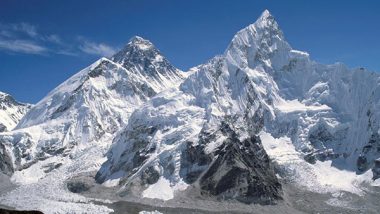Kathmandu [Nepal], May 3 (ANI): Nepal Supreme Court has issued a mandamus to the government of Nepal, instructing to impose a limit on the number of climbing permits for peaks in Nepal, which include Mount Everest.
A single bench of Justices Sapana Pradhan Malla and Sushma Lata Mathema had issued mandamus to the government directing limitation in expedition permits. The bench issued a directive responding to the writ petition on a Public Interest Litigation (PIL) filed by advocate Deepak Bikram Mishra.
Earlier this week, a brief summary was published directing the government to issue climbing permits only after considering the capacity of the mountain and to issue for a specific time.
Advocate Mishra filed the PIL at the Supreme Court in September 2019 with the office of the Nepali Prime Minister, Council of Minister, Ministry of Environment and Tourism, Sagarmatha Pollution Control Committee, and Nepal Mountaineering Association as defendants among others.
The Nepal Department of Tourism which oversees the issues of permits to climb the high-edging mountains of Nepal currently does not have any cap on the permits.
The apex court's intervention comes at a time when Nepali authorities have been issuing an increasing number of permits every year, particularly in the Everest region.
The mandamus hasn't given any specific number for the permits to be issued. Moreover, in the ongoing spring season, as of April 30, Nepal has issued climbing permits to 990 climbers from 79 countries to ascend 30 peaks, including permission for 390 climbers to scale Mount Everest.
Nepal has seen a spike in the number of permits to climb Mount Everest since 2019.
The year has been recorded as the year with the highest mortality blamed on the high traffic and short weather window for the summit push. A total of 381 climbers obtained permits that year with the government collecting 11,000 USD for each climber as revenue.
In 2021, Nepal issued 408 permits for Everest while 325 climbers obtained permits in 2022 and 478 permits for Everest in 2023, the highest on record.
With a rise in permits issued and deaths in the high zones, the court has ordered to cap the numbers, applying this to all the high-lying mountains that are open for expedition.
Additionally, focusing on the ecology of Everest, the Supreme Court also has reiterated restrictions on the use of helicopters from base camp to peaks, making emergency rescue purposes an exception.
In the 12-page summary verdict, the Supreme Court also stressed on the environmental and ecological ongoing in Everest and other mountains. It has stressed the necessity for proper waste management in mountainous regions to mitigate adverse effects on the environment and human health.
It added that anthropogenic activities were resulting in increased waste generation and degradation of the mountains.
The court also issued directives about managing the dead bodies, waste management, fair pay and working conditions for those involved in the mountaineering sector.
In addition, the court has further ordered the government to acknowledge and address the need for a better information system, loss and damage claim from Nepal regarding climate change, and effective implementation of the 3-year-long strategic work plan for the mountain clean-up campaign. (ANI)
(This is an unedited and auto-generated story from Syndicated News feed, LatestLY Staff may not have modified or edited the content body)













 Quickly
Quickly















